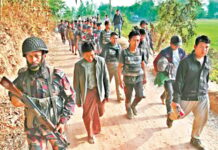Murder, genocide, persecution, collaboration with Pak army among 23 charges

This file photo shows BNP leader Salauddin Quader Chowdhury is being produced before the International Crimes Tribunal.
A tribunal in Dhaka, which is holding trial of BNP leader Salauddin Quader Chowdhury for his alleged wartime offences, will deliver its verdict tomorrow.
The 64-year old standing committee member of the main opposition party is facing 23 charges of wartime offences committed allegedly during Bangladesh’s Liberation War in 1971.
The charges include killing of around 200 civilians; collaborating with the Pakistani occupation army to kill and torture unarmed people, looting of valuables and torching of houses and other properties; persecuting people on religious and political grounds; and committing genocide.
If convicted, Chowdhury, son of Muslim League leader late Fazlul Quader Chowdhury, may get death penalty.
“The judgement has been prepared by this time. Let the case be fixed for delivery of judgement tomorrow,” announced Justice ATM Fazle Kabir, chairman of International Crimes Tribuanl-1 after the case was placed on the cause list of Tuesday’s proceedings.
Chowdhury was arrested on December 16, 2010 at Banani in the capital in connection with the torching of a car at Moghbazar on June 26 the same year.
After the ICT issued an arrested warrant on December 19, 2010, he was shown arrested for involvement with crimes against humanity.
According to the prosecution, Chowdhury was involved in the killings of Nutan Singh, founder of herbal medicine factory Kundeshwari Oushadhalaya, and 35 people at Jagatmallo Para and 69 others at Unasattar Para in Chittagong during the War of Independence.
Primary investigation shows Chowdhury with the help of Pakistan occupation forces led the murders and tortures near his Goods Hill residence in the port city, said the prosecution.
After the ending of arguments and other court proceedings, the three-member ICT-1 announced on August 14 that the case has been kept awaiting for judgement.
The prosecution sought the death penalty for the BNP leader while the defence claimed that the prosecution had failed to prove any of the 23 charges and appealed for his acquittal.
Forty-one prosecution witnesses, including an “eyewitness” who had claimed to have seen Salauddin shoot and kill Nutan Chandra Sinha during the 1971 Liberation War, gave their testimony.
The defence was able to bring in four witnesses, including the accused and his cousin, in its bid to prove Salauddin was innocent and that he was not in the country during the war.
Source: The Daily Star









